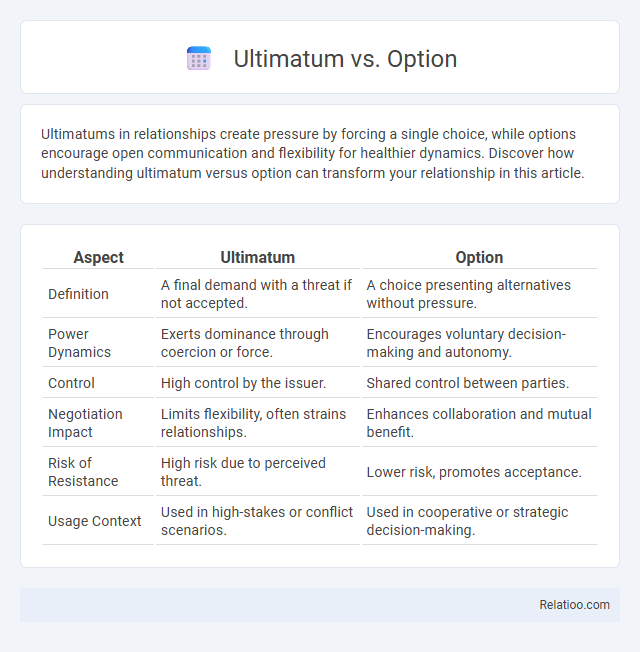Ultimatums in relationships create pressure by forcing a single choice, while options encourage open communication and flexibility for healthier dynamics. Discover how understanding ultimatum versus option can transform your relationship in this article.
Table of Comparison
| Aspect | Ultimatum | Option |
|---|---|---|
| Definition | A final demand with a threat if not accepted. | A choice presenting alternatives without pressure. |
| Power Dynamics | Exerts dominance through coercion or force. | Encourages voluntary decision-making and autonomy. |
| Control | High control by the issuer. | Shared control between parties. |
| Negotiation Impact | Limits flexibility, often strains relationships. | Enhances collaboration and mutual benefit. |
| Risk of Resistance | High risk due to perceived threat. | Lower risk, promotes acceptance. |
| Usage Context | Used in high-stakes or conflict scenarios. | Used in cooperative or strategic decision-making. |
Understanding Ultimatums and Options
Ultimatums impose strict demands with consequences if unmet, emphasizing non-negotiable conditions that force immediate decisions. Options provide flexibility by offering multiple possible outcomes or choices without mandatory consequences, allowing decision-makers to weigh alternatives. Understanding ultimatums versus options is critical in negotiation and strategic planning, where the clarity of demands and freedom of choice shape outcomes and stakeholder responses.
Key Differences: Ultimatum vs. Option
The key differences between ultimatum and option lie in their nature and implications for decision-making: an ultimatum is a demand backed by a threat or deadline requiring acceptance or rejection, whereas an option provides a choice without pressure or consequences for non-acceptance. Ultimatums often limit flexibility and force immediate responses, while options allow for consideration and voluntary selection based on preferences or strategic benefits. This distinction shapes negotiations and strategy, as ultimatums can escalate conflict, while options promote exploration and adaptability.
Psychological Impact on Decision-Making
Ultimatums often trigger heightened stress and resistance in decision-making, pressuring your cognitive resources and potentially leading to impulsive choices or defiance. Options provide a sense of autonomy and flexibility, enhancing your motivation and promoting thoughtful evaluation of possible outcomes. The psychological impact varies significantly, as ultimatums may evoke fear of loss, while options support perceived control, crucial for balanced and rational decision-making.
Communication Styles: Demands vs. Choices
Ultimatum communication emphasizes a rigid demand, often limiting the recipient's autonomy by presenting a single non-negotiable condition. Option communication introduces multiple choices, fostering engagement and allowing individuals to select based on preference, which enhances collaboration and reduces resistance. This contrast highlights that ultimatums prioritize control and compliance, whereas options promote flexibility and mutual decision-making.
Effective Scenarios for Using Ultimatums
Ultimatums are most effective in scenarios requiring clear boundaries or critical decisions, such as contract negotiations, legal disputes, or crisis management, where immediate compliance is essential. Unlike options, which provide flexibility and multiple pathways, ultimatums impose a non-negotiable demand, making them suitable when you need to assert control or prompt decisive action. Your strategic use of ultimatums can force resolution by highlighting consequences, especially when the stakes are high and compromise is unlikely.
When to Offer Options Instead
Offering options instead of ultimatums empowers Your audience by providing a sense of control and choice, which can reduce resistance and increase cooperation. Options are best used in situations requiring collaboration, negotiation, or when the goal is to foster positive relationships and long-term commitment. Ultimatums are more suitable for urgent, high-stakes scenarios where immediate compliance is essential and the stakes do not allow for negotiation.
Risks and Benefits of Ultimatums
Ultimatums carry significant risks, including damaging relationships and provoking resistance, yet they offer benefits such as clear boundaries and decisive outcomes. Unlike options, which provide flexibility and multiple paths, ultimatums force a strict choice that can expedite decision-making but limit collaboration. Your ability to weigh these factors determines if ultimatums effectively resolve conflicts or create unintended consequences.
Empowering Others Through Options
Offering options instead of ultimatums empowers others by fostering autonomy and collaborative decision-making. When you present choices, individuals feel valued and motivated to contribute meaningfully. This approach enhances engagement, trust, and long-term commitment in personal and professional relationships.
Conflict Resolution: Ultimatum or Option?
In conflict resolution, choosing between an ultimatum and an option significantly impacts the outcome. Ultimatums impose a non-negotiable demand, often escalating tensions and reducing collaboration, while options present flexible alternatives that encourage dialogue and mutual agreement. Effective conflict resolution favors options, as they promote open communication and create space for compromise, ultimately leading to more sustainable solutions.
Choosing the Right Approach for Positive Outcomes
Choosing the right approach between Ultimatum, Option, and Ultimatum is crucial for achieving positive outcomes in decision-making. Understanding the impact of ultimatums, which demand immediate compliance, versus options that provide flexibility, helps you tailor your strategy to the context, fostering cooperation and reducing resistance. Emphasizing options encourages collaboration and long-term success by empowering your audience with choice and control.

Infographic: Ultimatum vs Option
 relatioo.com
relatioo.com